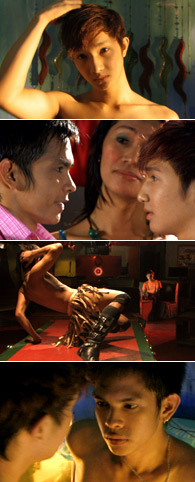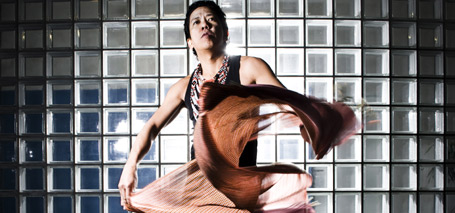Auraeus Solito's Boy is one of two films scheduled to be screened at the 22nd Singapore International Film Festival banned by the censors for "normalising" homosexuality and a "prolonged and explicit" homosexual scene which was filmed in a "romanticised manner." The only other film that was been disallowed is Shahida (Brides of Allah), a documentary by Israeli Natalie Assouline, for its pro-terrorism stance. Four additional films have been withdrawn; two of which, Females Games (by Kan Lume, Singapore) and Blind Pig Who Wants To Fly (by Edwin, Indonesia) were passed with edits for prolonged and explicit lesbian sex and for prolonged homosexual sex respectively. The festival has a no-cut screening policy.

Fridae catches up with Solito, who is probably best known for his 2006 Teddy Award-winning The Blossoming of Maximo Oliveros, to talk more about the ban and his semi-autobiographical coming of age film. (The Teddy Award is the official LGBT award at the Berlin International Film Festival.)
æ: Can you tell us more about I>Boy and the scene the censors object to?
Auraeus: Boy is my ode to the erotic Filipino genre, especially the 1998 Macho Dancer movie by Lino Brocka. Macho dancers are like male strippers with a very enticing and sensual way of dancing which I find aesthetically beautiful. Each generation in the Philippines has a "macho dancer" film. This is my deconstruction of that genre.
In the film, an unnamed teenager accepts himself, his homosexuality, when he falls in love with a Macho Dancer. He sells his comic books so that he can afford to buy him for one night. Of course, the climax of the film is when the Boy finally consummates his love with the Macho dancer.
It is this lovemaking scene (according to the festival organisers of SIFF) that the censors have disallowed. It is a very gentle and sensual scene. In fact, I have made series of screening tests in Manila and Amsterdam - and they found the scene sensual and beautiful. That is why I was totally surprised that the censors found this scene not fit for public viewing.
æ: The Straits Times (Singapore) reported that the Singapore censors "felt that the film normalised homosexuality and that the homosexual scene was prolonged and explicit and filmed in a romanticised manner." The panel chairman, Vijay Chandran, further observed that "the homosexual love-making scene has exceeded the guidelines and the board, by allowing it, will shift the markers set by the community." What are your thoughts?
Auraeus: Initially, I was so happy that the SIFF selected the film for competition. It however became a great disappointment that the censors in Singapore disallowed the film from screening in the festival.
The phrase "normalises homosexuality" and "romantises" very clearly articulates their homophobic view. Very weird to read that on one hand they felt Shahida (Brides of Allah) might promote hate and misunderstanding of the religion and on the other hand with the censorship of Boy and their comments, they are exacting just that - a phobic oppression of a sexual orientation that has to do with love! The hypocrisy is truly shocking for a very modern cosmopolitan society. To the censors: "Gay people also make love."
æ: Boy has been selected for [Silver Screen Awards] Asian Feature Film Competition. With the film being withdrawn, is it still in competition?
Auraeus: Nope. I have withdrawn from the competition. The Festival organisers have proposed that I show my film to the jury and remain in-competition, which has been done before. I didn't agree because I make my films for an audience not a jury.
æ: Your second feature film, Tuli (Circumcision), which was in competition at the CineManila Film Festival, got an X-rating from the MTRCB, banning its exhibition. The film was cut and shown without your permission; and it won the awards for Best Film and Best Director. As a filmmaker, is it better to show with cuts or not at all?
Auraeus: As a filmmaker, I prefer to show my film at its purest form. As an artist I want the freedom to express myself.
æ: What inspired Boy and is there a social message?
Auraeus: I have always wanted to direct an erotic film. I grew up in Manila, watching beautifully made "bold" films. These films somehow help me define my sexuality making me accept myself as a gay person.
But I wanted to make an erotica that is more sensitive and personal. The film is basically a rich Boy meets poor Boy film. It was almost like a documentary making this film, casting real macho dancers, female impersonators and a real poet (the lead Boy played by Aeious Asin is a Creative Writing major at the University of the Philippines). Only the parents - the Mother of the Boy and the Father of the macho dancer were played by professional actors.
The script was organic, being written day by day as we got closer with the macho dancers. I wanted to know who they really were. And why is it that since the People Power revolution in 1986, things have not really changed. People are still poor and getting poorer, the rich are still getting richer… And somehow when the rich Boy meets the poor boy, he finds his humanity in the poorest of the poor.
In Boy, I cast a real life macho dancer, Aries Pena, who plays himself. He tells me in one crucial scene that his fellow macho dancers told him while practicing his lines (which was based on how they really talked): "Finally we are being portrayed who we really are. And you (Aries Pena) are carrying our banner as people, dancing to survive!"
æ: Your first feature film The Blossoming of Maximo Oliveros, which won 15 international awards, is also a coming of age story. What is it about coming of age stories that inspires or attracts you?
Auraeus: I grow with my films. My first four features were my "growing-up" stage. For me it is the most beautiful yet painful time. So perhaps my next four, would be the more "grown up" filmmaker with characters who have come of age.
æ: When was the first time you fell in love or realised you are gay?
Auraeus: Like Maximo, I fell in love with my officer while I was having military training in high school at the age of 15. He always gave me high merits when I had the sharpest salute; and I was one of the boys who could keep up with him when we jogged around the campus.
Like the unnamed boy in Boy, at seventeen, when I went to my first gay bar and saw a macho dancer dancing which was a real turn-on. And when I felt this (it's genetic!:) I finally accepted that I'm gay.
So for me the erotic genre is very important for people to define their sexuality. This film is almost personal, for it captures that night when I finally accepted myself for who I am.
æ: How did you get into filmmaking?
Auraeus: Through a gay poetry reading when I read my poem "Bouyancy." I was given a scholarship by the head of the film school for a summer animation workshop. I also just came from my mother's hometown in Southern Palawan and met my indigenous relatives, after graduation from Theatre Arts in the University of the Philippines. When I witnessed a very sacred ritual from my tribe, the Palawan, I realised that theater itself was not enough to capture our people's culture, so I realised I needed a new medium…. And serendipitously, when I went back to Manila, I was offered this filmmaking workshop.
æ: What projects are you working on now?
Auraeus: A dream film about my indigenous roots in Palawan, a documentary of Filipino migrants in Amsterdam and a theatre comeback (I was a theatre director before I went to film. The last play I directed was 10 years ago.)
æ: What is your vision for the gay community?
Auraeus: An un-materialistic, free, open and truly liberated community not based on "western" standards but each culture's distinctness that is full of humanity and compassion.
æ: Tell us about a cause that you support?
Auraeus: Indigenous People Rights. I have Palawanon indigenous blood.

